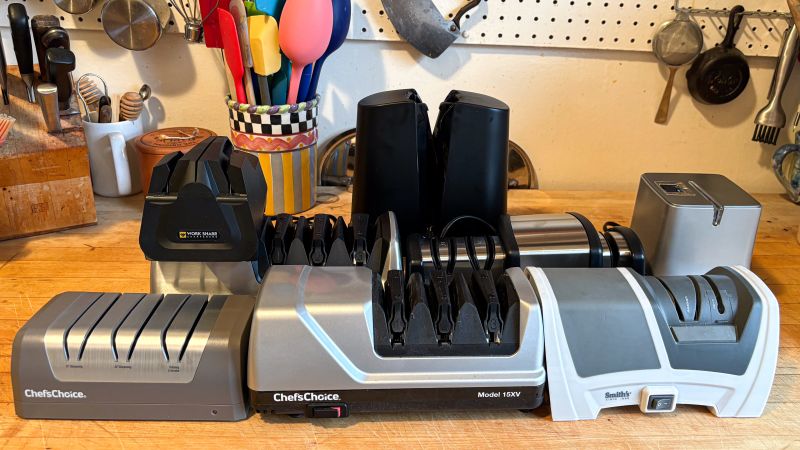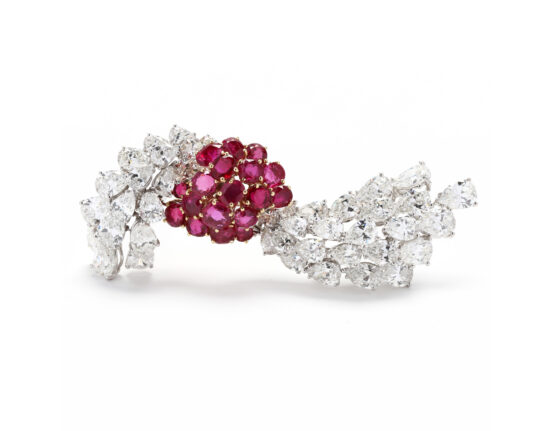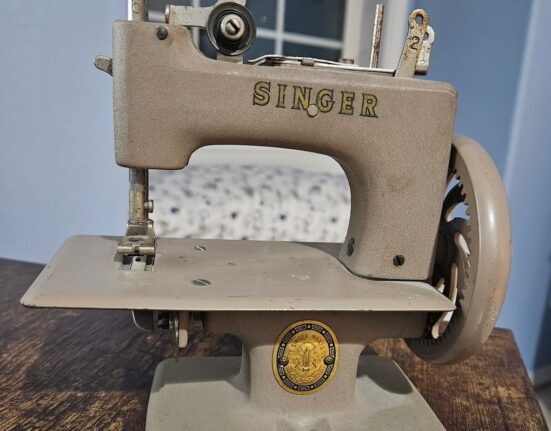The best knife sharpeners we tested:
Nothing puts the joy in cooking like a sharp knife. It helps you chop, dice, and slice quickly, evenly and precisely. Yet, mostly inadvertently, too many kitchens are equipped with knives that can’t make the cut. Thankfully, there’s a slew of very effective and easy to use electric and handheld knife sharpeners that can put an edge on even the dullest blade.
Home cooks tell us they’re afraid that sharp knives are unsafe, confused as to how to sharpen a blade, and even concerned that sharpening will damage their expensive cutlery. But the truth is, a sharp knife is a safer one as it cuts down easily and is less likely to slip sideways, injuring a finger. And using a knife sharpener is pretty much foolproof. As to ruining the blade, you’d probably have to sharpen a knife for years before you’d remove enough metal to notice a difference in the shape of the blade.
To help you choose the best knife sharpener, we spent several weeks testing 15 of the top-rated knife sharpeners. We dulled knives, then sharpened them and used them to slash through paper and slice tomatoes and onions to see which ones came out best. In the end, we found three winners guaranteed to give you an edge in the kitchen.
Best knife sharpener overall
We don’t think there’s any serious competition for this electric sharpener when it comes to putting an edge on a knife. Plus, it’s fast, foolproof to use and solidly constructed.
Best budget electric knife sharpener
If you don’t want to spend a bundle but want razor sharp knives, consider this no-frills electric model.
Best manual knife sharpener
This nonelectric sharpener gives a blunt knife an impressively sharp edge. Plus, it’s small enough to stash in a drawer or carry with you.
Sharon Franke/CNN Underscored
Hands down, the electric Chef’sChoice 15XV Professional Electric Knife Sharpener is the best knife sharpener we tested. It’s easy to use, works quickly and builds up a smooth, incomparably sharp and long lasting edge on a knife from the heel to the tip. If you’re a serious cook who revels in tasks like slicing onions thinly for a gratin, dicing vegetables to garnish a soup and carving beautiful slices from a rare roast beef, this sharpener is well worth its relatively high price.
The Chef’s Choice uses diamond abrasives to sharpen a knife in two stages to a 15 degree angle and then hone or polish the edge. To sharpen, you insert the heel of a knife into one of the slots for the first stage. Once you place it in the sharpener, it’s held firmly in the correct position so you can’t misalign the blade; then you pull the knife through slowly and steadily. You then repeat with the other slot and side of the knife. After a few swipes, you move on to the second stage. Once you’ve created a new edge, you quickly run it through the honing slots. Because it works in three stages, whereas other sharpeners only use one or two, the 15XV takes a little extra time to sharpen but because it works quickly, it’s still a lot faster than almost every other model.
Wondering how you know when you’ve achieved a new edge? The manual that comes with this sharpener is extremely thorough and explains how to check the blade to see if it’s sharpened. If you want to geek out about knives, the manual is also packed with detailed information about customizing a blade for various purposes as well as instructions for touching up serrated cutlery like bread, steak and tomato knives in the honing slots.
This is a super solid, well-made product. It doesn’t require much maintenance other than wiping it clean and occasionally brushing out metal shavings from a compartment in the bottom of the unit. While it won’t fit in a typical kitchen drawer, this sharpener, which is about the size of a standard tissue box, won’t take up too much room in a cabinet or pantry closet. It comes with a limited 3 year warranty.
$49 at Amazon and Walmart
Sharon Franke/CNN Underscored
If you want to keep your knives razor sharp but aren’t too particular about the angle and don’t want to spend a bundle, we highly recommend the Smith’s Essentials Deluxe Diamond Electric Knife Sharpener. It has slots for the left and right side of a blade and uses diamonds and electricity to quickly create a sharp 20 degree edge; in addition, there’s a set of slots with ceramic stones for manually honing a sharpened blade or restoring the bite to bread knives.
The owner’s manual tells you everything you need to know in order to use the sharpener but doesn’t get into any specifics about knife angles and sharpening. Overall, this is a very good option for home cooks who want sharp knives to make getting dinner on the table easier; it isn’t a model for knife nerds or anyone who owns an assortment of knives with different angles. With it, you get a limited 3 year warranty.
Sharon Franke/CNN Underscored
The small Chef’sChoice 4643 Manual Knife Sharpener uses diamond abrasives and the power of your hand for sharpening. It has one slot for a 15 degree angle, one for a 20 degree angle, and another for honing so it works on both sides of a knife at once. This, plus the fact that you sharpen in a back and forth motion, gives fast results. However, it didn’t produce as smooth an edge as an electric model. When we sliced tomatoes and onions, we could feel the blade “bite” a little, rather than glide. However, the 4643 gave us a sharper blade than any of the other manual sharpeners we tested.
We especially appreciated that using the honing slot, you can touch up serrated blades. This model is slightly inconvenient for lefties because the numbers on the slots are only visible when it’s held in the left hand and the right hand is holding the knife.
As it’s small enough to stash in a drawer, it can be readily available when you’re no longer slicing and dicing easily and is a good option for honing on a regular basis. There are less expensive non electric sharpeners to be had but it’s worth paying a little more to have a well designed effective tool for making your life in the kitchen a whole lot easier.
All of the products we tested keep knives at a consistent angle as they sharpen eliminating the need to position a blade correctly and holding it steady as you work. Most of them are virtually failproof. Here are a few other things to consider before you choose.
For the most part, models with a plug (or a charge) are more expensive. They’re also larger so you’ll want to store them in a cabinet or a closet. We recommend keeping them easily accessible so that when you notice your knives are losing their edge, finding and dragging out the sharpener won’t be an excuse to delay using it. Electric models are powerful and work quickly, giving knives a very smooth edge.
The beauty of manual models is that they’re very affordable and easy to stash in a drawer where they’re easy to grab, making it more likely that you’ll pull one out and use it on a regular basis. However, there is a compromise in the evenness of the edge.
Knife sharpeners are designed to give blades a sharp edge. That’s the first stage. Many, even low-priced ones, also have a second stage to hone or polish after sharpening. Think of a sharpener as an emery board. You use the rough side to file and shape your nails, then the fine side to give them a smooth refined edge. When you use a knife that hasn’t been honed, it may bite or tear rather than glide as it slices into food. But a roughly sharpened knife is still a lot easier and safer to work with than a dull one.
Our top pick, the Chef’sChoice Model 15XV Professional Electric Knife Sharpener sharpens in two stages, building up a very durable blade, and then hones in a third stage.
The angle of the edge dictates its sharpness. The smaller the angle, the thinner and sharper the blade. However, a thin edge is a delicate one that’s more likely to bend. Until recently, so-called European or western knives were sharpened to 20 degrees so they could withstand the rigors of cutting up hard vegetables and large cuts of meat. On the other hand, Asian knives, which were primarily used to slice fish and make fancy cuts, were given a 15 degree edge. Today, even many European knives are sharpened to 15 degrees. Most manufacturers’ websites say to which angle their knives are sharpened.
On some knife sharpeners, there’s a choice of angles. You can maintain the one that your knife came with or make it thinner or wider as you prefer. However, keep in mind that for the most part, the angle of the edge is microscopic. You’re more likely to be able to tell that a western knife is heavier and sturdier and an Asian knife lighter and more delicate because of a wider or thinner edge. Many knife sharpeners don’t give you a choice of angle and for most home cooks that’s OK because it’s more important that your knife cut easily than be sharpened to a specific angle.
What about sharpening steels and stones?
Sharpening steels, those long rods which are included with many sets, are designed to hone, rather than sharpen a blade to lengthen the time between resharpenings. However, in order for a steel to be effective, you have to run the entire knife along it while maintaining a precise, steady angle. A better way to keep your knife honed is by running it through the fine stage on your sharpener.
Many pros swear by stones, like this King Whetstone Sharpener Set, and they certainly can put a smooth fine edge on a knife blade. But to use one, you have to master the art of holding the blade at a consistent angle which requires a steady hand and a steep learning curve. If you put in the time and effort to develop the skill of using a stone, you’ll be rewarded with a beautiful result. But for most people, we think a product that makes sharpening easy by maintaining an angle for you is the best method.
Over several days, we used each sharpener according to the manufacturer’s directions to sharpen the blade of the Zwilling Pro 8-inch chef’s knife from one of our best kitchen knife sets after it had been dulled by running it over a chunk of concrete 30 times. When it could easily slice a sheet of paper, we considered it sharpened. Carefully, we ran a finger over the edge of the blade to see if it felt smooth or rough. Then we put it to a real life test: How easily and thinly could it slice tomatoes and onions?
As we worked, we noted how easy each sharpener was to use, including whether the instructions were thorough and understandable. We also considered the quality of construction, the aesthetics of the product and the warranty. We downgraded models that didn’t feel totally safe to use.
Sharpening: With well sharpened knives we were able to slash through paper from the heel to the tip of a blade, leaving a clean cut. In addition, using very little pressure, we could easily pierce the skin of a tomato and cut right through the flesh to create thin slices. We were also able to slice onions and the sharper the knife, the thinner the slices. If, when we ran our finger over the edge of the blade, it was smooth and even, we gave the sharpener high marks.
Guidance: As many users are not familiar with knife sharpening, we considered it important that the included instructions were thorough and easy to follow.
Quality of construction: We considered if products were solidly built and if they remained steady while being used.
General looks: Aesthetics aren’t terribly important when it comes to a knife sharpener as you’re not likely to keep it out on the countertop. However, attractive products are more pleasant to use and if a sharpener does happen to be particularly handsome as well as effective, you just might want to keep it out on display.
Warranty: We noted warranty information, giving it weight when it came to pricey electric models.
Anyone who has a collection of high quality knives for various purposes that they want to sharpen to different angles will want the Chef’sChoice AngleSelect Professional Electric Knife Sharpener 1520. While it won’t build up quite as durable a blade as the our top pic, the 15XV, it gives you the option of sharpening to a 15 or 20 degree angle and puts an extremely smooth and even edge on a knife. It uses diamond abrasives, has slots for the right and left side of the knife for both angles and for honing or sharpening scissor blades. Because it only has one sharpening stage, the Chef’s Choice sharpens more quickly than the 15XV and requires fewer pulls than almost every other model we tested. As it does with all its sharpeners, the manufacturer includes extremely detailed instructions.
Talk about small but mighty. The Smith’s Kitchen IQ Edge Grip Knife Sharpener could be mistaken for a computer mouse but restored an edge to a knife so dull it couldn’t even nick paper. In spite of its petite size, the Edge Grip has both coarse and fine slots so it both sharpens and polishes. With markings on both sides, it’s righty and lefty friendly. It’s small enough to carry in a bag or even a pocket if you’re going to be cooking in someone else’s house and anticipate finding a knife that’s less than sharp.
Small as the hand-powered Smith’s Adjustable Diamond Edge Grip Adjustable Knife Sharpener is, it has both a coarse slot for sharpening, a fine one for honing or touching up serrated blades and a mechanism to set the coarse slot for a 25, 20, or 15 degree angle. Diamond abrasives on the first stage help it work quickly. As the slots are labeled on both sides, it’s convenient for right- and left-handed cooks. The Smith’s is small enough to tuck in a kitchen drawer. With its ability to sharpen to a thin 15 degree angle that’s ideal for fileting fish or a wide and sturdy 25 degree angle for cutting up a carcass, it would be a great addition to a fisherman’s or hunter’s supply bag.
Chef’s Choice has designed a version of its electric knife sharpener that’s more compact and rechargeable so it can be used in situations where there’s no access to an electric outlet. Think tailgating, fly fishing, camping or family reunion. It charges in a USB-C port in under an hour and holds a charge for 45 minutes, more than enough time to sharpen up knives for carving up a smoked turkey or brisket or fileting a basket of trout. Like the brand’s other sharpeners, it uses diamond abrasives. There are slots for 15 and 20 degree angles and a stropping stage for finishing. In size, it’s about equal to a box of crackers. Foodies who cook when they travel will love to have this sharpener in their arsenal.
The Chef’sChoice Hybrid AngleSelect Diamond Hone Knife Sharpener Model 290 combines electric sharpening at either a 15 or 20 degree angle and manual honing. While it uses diamonds and puts a smooth edge on a knife quickly, it doesn’t work quite as fast or impart as even an edge as our top pick, the all electric Chef’s Choice 1520. However it’s half the price, making it definitely worth your consideration if you’re on a budget.
In spite of being nonelectric and small enough to keep in a drawer or tuck in a bag, the Smith’s Gourmet Diamond Edge Knife Sharpener put an impressive edge on our dull chef’s knife. It uses diamonds on the coarse stage and ceramic rods on the fine one and only sharpens to a 20 degree angle. With a handle that resembles a knife’s, it gives you a good grip when you work. The markings are displayed on both sides, making it easy to use with either hand. It’s a good choice for anyone looking for a relatively inexpensive nonelectric but sturdy and effective tool.
With just 10 swipes, this no nonsense tool turns a blunt blade into one with a 20 degree angle that’s sharp enough to cut up vegetables. It has one slot with diamonds for sharpening, one with ceramic discs for honing and a small diamond surface for renewing scissors. While the rubber handle gives a good grip, it is hefty for a small hand. Aesthetically, this sharpener looks like it belongs in a tool box rather than a kitchen drawer.
The Work Sharp Kitchen Knife Sharpener is unusual in that it turns off after 50 seconds, which the manufacturer suggests is long enough to put an edge on a blade — but we found it shut off in the middle of the last swipe. In spite of that, we could easily slash through paper and create almost transparent tomato and onion slices. However, the knife blade didn’t feel perfectly even or smooth. There are slots for sharpening each side of a knife for a 20 degree edge and one for honing. The sharpener probably won’t fit in a drawer but is compact in size compared to other electric models. Although it doesn’t seem particularly well built, it’s certainly a better choice than no sharpener at all.
The Zwilling V-Edge is a large manual sharpener with just one slot for sharpening and honing. It comes with two sets of ceramic rods for 15 and 20 degree angles; each rod has two sides, one coarse and one fine. In the bottom of the unit, there’s storage for the pair you’re not using. When you move from one stage to another you have to remove and reposition the rods. It’s not particularly difficult to do but it’s one more step you have to take to sharpen a knife. But the bigger issue is that it took many pulls before a knife was sharp enough to roughly cut paper and then it wasn’t able to slice a tomato.
The point of differentiation for the Smith’s Mesa Diamond Adjustable Electric Knife Sharpener is that you can dial in an angle from 10 to 30 degrees. However there’s only one slot for both sides of the knife and none for honing. When we used it, if we didn’t keep the knife carefully positioned, it didn’t make contact with the synthetic diamond abrasives, which led to inconsistent sharpening. While after many pulls, we were able to get an edge that was sharp enough to cut through paper and with pressure cut onions thickly, the sharpened knife couldn’t even put a dent in the skin of a tomato. Considering its large size, erratic operation, high price, and poor performance, this isn’t a recommended product.
Zwilling 5-in-1 Knife and Scissor Sharpener
On the Zwilling 5-in-1 Knife and Scissor Sharpener you’ll find coarse and fine sharpening slots for 20 and 15 degree angles as well as a scissor sharpener. But we found that even after pulling a knife through the slots 50 times, we couldn’t use it to cut up a tomato. For that reason, the fact that it’s small, easy to stow and transport and convenient for lefties and righties doesn’t count for much.
We were excited to test the innovative HORL2. It consists of 2 pieces: A small wood block with magnets on either edge, one of which is slanted to a 15 degree angle and the other to a 20 degree one; and a small cylinder with diamond abrasives on one end and ceramic abrasives on the opposite end. You place your knife on the counter with the blade facing upwards and then attach one side of the block to it — the magnets hold it in place. Next, you roll first the diamond or rough side of the cylinder along the edge of the knife to sharpen it and then the ceramic side to hone it. Then, you repeat the process with the other side of the knife. The simplicity of the product, which is beautifully finished in oak or walnut, is very appealing but it’s unnerving to work with the blade pointing up. The worst news is that two different testers just couldn’t get a very sharp edge on a knife, even after many rolls and careful viewing of the manufacturer’s video. We can’t understand what would justify paying top dollar for this product.
The Tumbler Diamond Rolling Knife Sharpener Set is identical in concept to the HORL2 with the main point of difference being that the honing side of the cylinder is stainless steel rather than ceramic. We had even less success sharpening a knife with the Tumbler, going as far as to roll the cylinder against the knife 70 times on each side.







